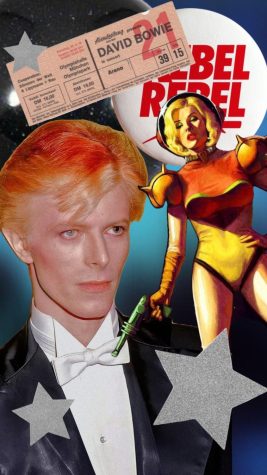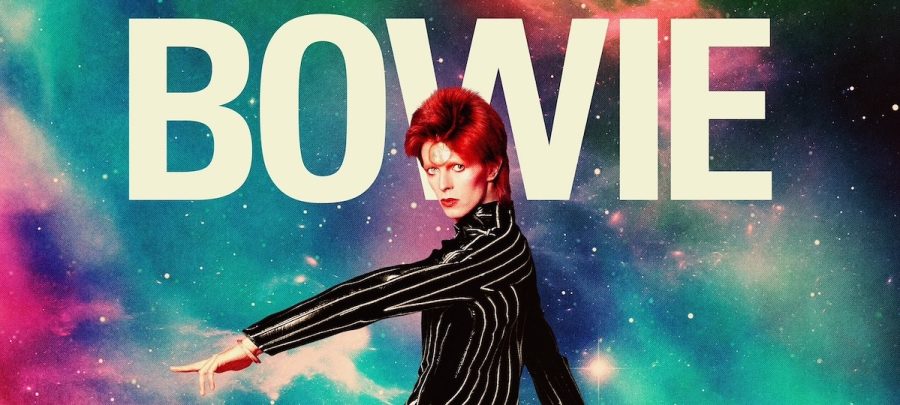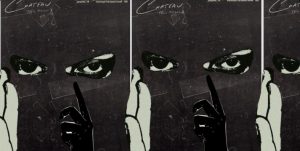Moonage Daydream, the David Bowie Musical-Documentary Experience, is Life Changing
Official movie poster for Moonage Daydream by Brett Morgen. (Photography by: Neon)
December 19, 2022
The newest revolutionary addition in cinematography history, “Moonage Daydream”—named after the hit song off David Bowie’s “The Rise and Fall of Ziggy Stardust and the Spiders from Mars” album—is a two-hour and fourteen-minute trip show about the flamboyant icon, David Bowie.
Covering everything from his early performing days to where he lived in his forties, this musical documentary takes us on a psychedelic journey through the intricately curated career of Bowie and everything he achieved throughout his life. This glittering film by Brett Morgen showcases never before seen footage and live performances from Bowie’s lifetime in a loud, wild, and groundbreaking manner. From eye-burning neon lights to eardrum-shattering music, this film opens the multicolor keyhole in David Bowie’s mystical and artistic life.
A swift ten minutes into the film you are hit with the most mind-boggling, extraordinary visuals you will ever see in your life, transcending all norms and breaking boundaries that other filmmakers might have only shyly dipped their feet into. That pool of greatness and otherworldly creativity might seem scary and threatening as a creator, but this film shows us that Bowie took those chances and swam in that pool of rainbow and creation. Morgen took all of those chances too, ensuring that he did Bowie justice with this concert documentary. And justice was rightfully served in an opal chalice as we watched Bowie dance across the stage in Britain and transform musical literacy in Berlin.
After you settle down from the abrupt flickering colors and mesmerizing—disjointed—visuals, you suddenly hear everything Bowie is saying after all these interviews that happened throughout his life. With a bit of humor, he’s telling the camera about how he worships life and that he creates in unorthodox, sporadic ways. It is staggering to hear glam-rock be transformative and new from the perspective of someone who was there, versus those who live after the era of its prime. Bowie was there—in 1972—making something and bringing people together, but it was never just one thing. Bowie was a jack of all trades, a father to anything he could get his hands on; painting, sculpting, filmmaking, writing, producing music—he was able to do it all. A lot of the films heavily focus on his style and process rather than the early years, childhood, and pre-musician. He had this way of making music where once he saw his success—the parade in his name, the blistering neon lights of fame—he dropped everything and started again. Once glam-rock was done, he touched pop and jazz and art-rock and everything was there at his fingertips because Bowie’s talent just never ran dry.

The film did its best at showing Bowie’s genius creations—the entirety of his career. As the film stays explosive, brave, and thespian, it is still informative and wildly introspective. This entire time the visuals might seem unrelated or just for the wow factor, but it really embodied the essence of Bowie. It is mind-melting and eclectic. His sonic red hair really set the mediator for the film and the start of it all for Bowie, it was a building block for the coloring and passion that flows throughout the entire film. And maybe that’s just Ziggy Stardust, maybe that was a character or a pseudonym for Bowie—a mask or disguise—but it’s so unique that you might feel ashamed for not reaching his level, not making something the way he did or existing the way Bowie existed.
Morgen presents this fascinating film that has you gripping the armrests of your seat, and the film is wildly nostalgic. When Bowie goes from one song to another, you are smiling and tapping your fingers because he is dancing around the stage and you want to do that too. All the swelling music makes you want to join the crowd of cheering, sobbing, and smiling people that only makes you wish you were right there in 1979 screaming your head off just watching Bowie sparkle beyond comparison. The grit, film texture, and grain tell us it is history and there will never be anything like it. You can’t replicate Bowie’s live-wire passion and his everlasting love and dedication to his anti-mainstream art. His craft was so meticulously curated to his life because he truly—in every way—was an artist of many facets.
It’s not just a movie, it is this theatrical production with a thousand things swirling around you all at once to the point that you forget where you are and what you’re doing. The colors singe your eyes and the music blows out your ear drums, but you can’t look away. Nothing can pull you out of it because it’s captivating—it is an addicting and entirely immersive experience. When you are watching it many get emotional because people are moved by the art he makes. The world he painted was gold, silver, hot pink, blistering teal, royal blue, and space-ship silver. The Bowie universe was everything that ever existed, and something that never did all at once, because Bowie had the ability to invent.
So if you are looking for a show-stopping, an oddball film with stellar music and overlapping arts—a sound for every visual and a visual for every sound—then “Moonage Daydream” is the perfect experience that will, without a doubt, change your life. From yellow-plaid suit jackets to silvering jumpsuits, this evasive story with maximalism imagery is a charting movie that is causing positive uproar—just like Bowie’s career did.
This crazy electric feature will have you dancing around your room to “Sound and Vision”. There is untouched passion—unreachable by any artist now today. As you watch Bowie sing and rock, it will seep into your bones. After you are done listening, the phrase ‘Don’t you wonder sometimes about sound and vision’ will repeat in your head.



